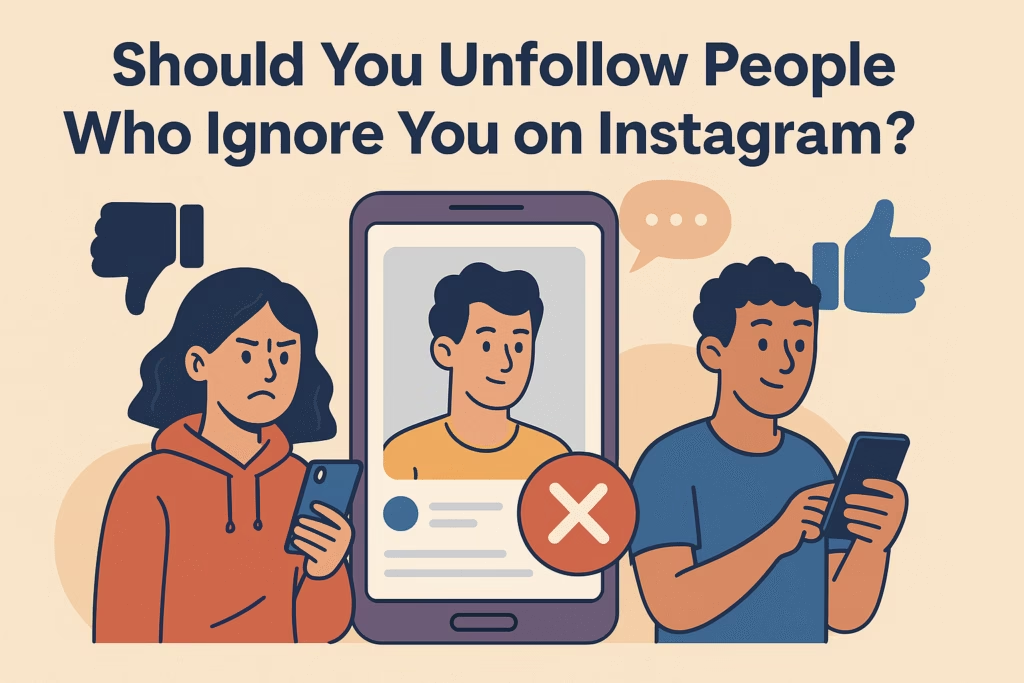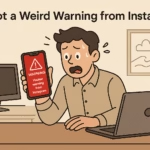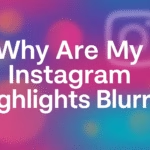You followed them because it felt polite. Friendly. Familiar. It was your version of a social nod in the digital hallway — a way to say, “Hey, I remember you,” without actually saying anything.
Maybe it was a classmate you sat next to during finals week, a familiar name from your neighborhood, or just someone who hovered at the edges of your social circles during high school. You tapped that follow button thinking it was just a harmless gesture. One that, at the very least, would be reciprocated.
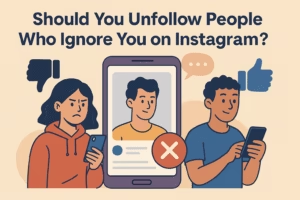
But they never followed back. Not a week later. Not a month later. Not even after you liked their birthday post or hyped them up in a story reply.
Now it’s been a whole year. Their name still haunts your “Following” list like a digital ghost. You don’t dislike them — it’s not that deep — but there’s a lingering weirdness. A passive awkwardness. Like you accidentally enrolled yourself in a fan club where the only member is you.
And here’s the thing: you’re not being dramatic. This is the silent social tension a lot of us wrestle with online. We followed someone out of social courtesy, and in return, got radio silence.
So now the big question bubbles up again:
Would it be petty to unfollow them?
The internet remains divided. One side screams, “It’s just Instagram, stop overthinking it!” The other claps back with, “If they can’t hit follow, they don’t deserve a spot in your feed.
But you’re not here for hot takes. You want clarity.
Let’s break it down — without the noise or the drama.
TL;DR — Is Unfollowing Non-Followers Petty?
- No, it’s not petty — it’s about curating your space, not revenge
- Social follow-backs aren’t a social contract — they’re optional, not required
- If their content doesn’t serve you or the connection’s dead, it’s okay to unfollow
- Engagement affects your algorithm, so cleaning up your follow list can boost your reach
- Tools like Flick help you analyze follower engagement and spot ghost accounts
Why You Probably Followed Them in the First Place
Let’s not lie. Most of us don’t hit that follow button because we’re obsessed with someone’s content. Especially not during the “new account” phase.
We follow people out of:
- Habit — “Everyone follows their old classmates, right?
- Social pressure — “If I don’t follow them, it might seem rude.”
- Hope — “Maybe they’ll follow me back.”
- Fear of missing out — “What if they post something important and I miss it?”
It’s emotional. And completely human. We want to be included — or at least acknowledged.
The problem is, when that follow turns into a one-way street, it can feel awkward. You’re seeing their updates, cheering their wins, and supporting their content… while they’ve likely forgotten you exist.
Even worse? The algorithm notices too.
What Unfollowing Really Means (and What It Doesn’t)
Let’s get brutally honest: unfollowing someone doesn’t make you petty. It makes you selective.
Here’s what unfollowing does mean:
- You’re taking control of your feed and your energy
- You want your content diet to feel relevant, not obligatory
- You’re trimming digital weight that no longer serves a purpose
And here’s what it doesn’t mean:
- You hate them
- You’re trying to “send a message”
- You’re doing it for drama
In fact, most people won’t even notice you unfollowed them. Instagram doesn’t send a notification. The only people who care are the ones who use third-party follower trackers — and let’s be real, you don’t need to worry about impressing that crowd.
If you’re unsure who’s engaging and who’s ghosting, tools like Flick give you analytics on your follower quality and post interactions — so you can make clean, data-driven choices instead of emotional ones.
How Social Clean-Ups Actually Help the Algorithm
Here’s what they don’t tell you: a bloated following list can actually hurt your performance.
Why?
Because Instagram’s algorithm is constantly calculating your engagement-to-follower ratio. If you’re following dozens of people who never engage with you — and worse, they don’t even follow you back — you’re sending mixed signals to the system.
It assumes your content isn’t relevant. It assumes your audience isn’t responsive. And it starts suppressing your reach.
That’s why content creators, marketers, and even regular users do regular “follower audits.” They trim dead weight.
Cleaning up your follow list:
- Improves your feed relevance
- Boosts your engagement metrics
- Sends a signal to the algorithm that you’re serious about authentic interaction
When Unfollowing Does Cross the Line
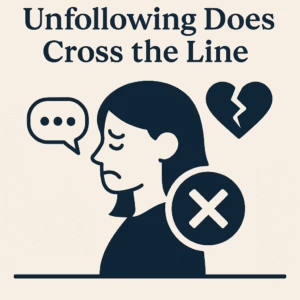
Let’s be fair: there’s a difference between managing your digital space… and going full petty detective.
Unfollowing someone because they ghosted you on a message? Reasonable.
Unfollowing them because they didn’t like your last three Reels? A little dramatic.
Unfollowing, re-following, then unfollowing again to get attention? Now we’re entering red flag territory.
Here’s a good rule of thumb: if you’re spending more than 10 seconds debating whether it’ll “send a message,” it probably will — and not the kind you want to send.
So ask yourself:
- Do you feel lighter after the unfollow?
- Does it clean your feed or just feed your ego?
- Are you doing it to protect your peace, or provoke a reaction?
Be honest.
What If They Notice?
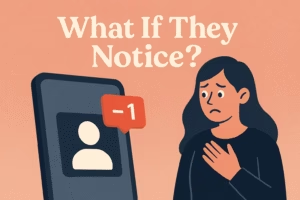
Ah yes, the elephant in the DM: what if they see you’ve unfollowed them?
Here’s the truth — they probably won’t. Most people don’t use apps that track this stuff, and if they do… they’re already obsessed with numbers and not your personal connection.
But let’s say they do notice.
Then what?
If someone confronts you about it, that says more about them than it does about you. A healthy digital relationship shouldn’t hinge on mutual follows. If the connection mattered, it would extend beyond a button.
And if they ghost you, block you, or make drama out of it?
Congratulations. You just dodged unnecessary noise in your life.
The Hidden Perks of Unfollowing Without Guilt
Here’s what happens when you stop treating the follow button like a loyalty badge:
- You take back control of your algorithm
- You gain mental clarity
- You feel more aligned with your identity
- You post more freely
It’s not just about them. It’s about you. About reclaiming your digital environment and saying: “This space reflects who I am now — not who I used to know.”
Final Take: Your Feed, Your Rules
It’s not petty to unfollow people who never followed you back.
It’s practical. Healthy. Necessary.
We’ve been conditioned to think that “unfollowing” equals hostility. That it sends some kind of digital death threat. But in reality, it’s a silent act of self-respect.
If someone’s content doesn’t resonate with you… if they don’t engage with your presence… if your connection was never mutual to begin with?
You’re not obligated to keep giving them your attention.
This isn’t high school. You don’t owe anyone a permanent seat on your timeline.
So yes — unfollow. Curate. Reclaim your feed.
Your peace > their numbers.
And if you ever want help cleaning house with clarity (not spite), a tool like Flick helps you track engagement and refine your audience for real growth — no drama required.
